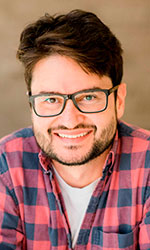In creating a program that could play the ancient Chinese board game Go – the aim of which is to surround more territory than the opponent – researchers at DeepMind fed their machine learning system a diet of about 30 million Go moves and set it against the one opponent it couldn’t beat: itself.
Thousands of matches later, researchers had a program able to conquer the last of the once-thought-unsolvable classical board games – one with a nearly inexhaustible number of plays.

The problem is, according to Levi Lelis, a University of Alberta artificial intelligence (AI) researcher in the Faculty of Science and fellow of the Alberta Machine Intelligence Institute (Amii), systems such as AlphaGo store what they learn in black-box models such as neural networks, which makes it hard for us to understand the strategy it has learned.
“You might be able to learn a little from the system by watching it play, but it is very difficult to open up the code of the system and see what the AI has learned about the game,” he said.
To better learn from these strategies being encoded by machine learning programs, Lelis’ research team is developing heuristic search algorithms that will allow researchers to “pop the hood” on intelligent systems that have learned how to solve problems and play games.
Beyond video and board games, Lelis has employed a slightly different use of this work, which sees the program teach humans strategies for curling.
Using a curling tool developed by computing science colleague Mike Bowling, also an Amii fellow, Lelis’ algorithms untangle the code and make it accessible. In experiments performed so far, the system was able to teach those new to the sport of curling general strategies such as hiding a rock behind other rocks.
“It’s almost like having the system writing a strategy manual for us, so that curlers could read and learn novel strategies for playing the game,” he said.
In support of this work, Lelis was one of 12 U of A researchers named as Canada CIFAR AI Chairs at Amii.
CIFAR is a Canadian-based global research organization that brings together teams of top researchers from around the world to address complex questions and identify new areas of scholarship where Canada has the potential to lead.
CIFAR works in close collaboration with Canada’s three national AI Institutes – Mila in Montreal, the Vector Institute in Toronto and the Edmonton-based Amii, a non-profit institute that supports world-leading research in AI and machine learning and translates scientific advancement into industry adoption.
“For nearly 20 years, Amii and the University of Alberta have advanced some of the world’s most innovative technologies, solved many of AI’s most challenging problems and developed a global hub for AI talent,” said Cam Linke, Amii CEO and recent U of A master’s graduate in computing science. “This new roster of AI Chairs is the next step in growing Alberta’s AI advantage and inspiring world-changing machine intelligence for good and for all.”
Of the 12 chairs, 10 are in the Department of Computing Science, while Patrick Pilarski is a prosthetics researcher in the Faculty of Medicine & Dentistry and Lei Ma is professor in the Department of Electrical and Computer Engineering. Computing science professor Russ Greiner is an adjunct professor in the Department of Psychiatry.
All told, 109 chairs will share in $86.5 million to advance research in a range of fundamental and applied AI topics, from drug discovery and machine learning for health to autonomous vehicles, materials discovery, human-AI interaction, natural language prediction and more.
“It’s absolutely amazing the kind of support the grant is offering,” said Lelis, who said it will allow him to hire graduate students and post-doctoral fellows to help follow up on a backlog of projects.
“I really don’t see a better place in the world right now to do this kind of research than the U of A, and the chair makes it the perfect environment to pursue these research questions,” said Lelis.
U of A Canada CIFAR AI Chairs at Amii
- Mike Bowling, Department of Computing Science
- Russ Greiner, Department of Computing Science and adjunct in the Department of Psychiatry
- Matthew Guzdial, Department of Computing Science
- Nidhi Hegde, Department of Computing Science
- Levi Lelis, Department of Computing Science
- Lei Ma, Department of Electrical and Computer Engineering
- Martin Mueller, Department of Computing Science
- Patrick Pilarski, Department of Medicine and adjunct in the Faculty of Rehabilitation Medicine and Department of Computing Science
- Dale Schuurmans, Department of Computing Science
- Richard Sutton, Department of Computing Science
- Matt Taylor, Department of Computing Science
- Osmar Zaiane, Department of Computing Science
| By Michael Brown for © Troy Media
The views, opinions and positions expressed by columnists and contributors are the author’s alone. They do not inherently or expressly reflect the views, opinions and/or positions of our publication.
